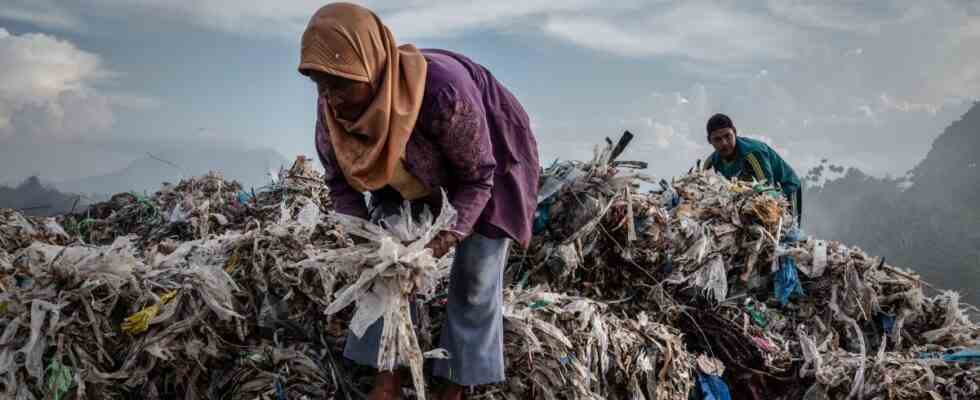Steven Guilbeault has seen many G-7 meetings but none from the inside. “Very enlightening” were his days in Berlin, says the Canadian. “There are things that are difficult to understand when you are outside.” He was outside as an activist for many years, most recently for Greenpeace. Inside he was now as Canada’s new Minister of the Environment. They didn’t argue, he says, because the war in Ukraine had welded the seven large industrialized countries too closely together. “What is at stake here is the future of democracy,” says Guilbeault. “If we are no longer there for each other, there is not much hope for democracy.”
Being there for each other is a big topic at the meeting in Berlin. The Ministers for Energy, Climate and Environment are meeting together for the first time. After all, the three major crises in the world – global warming, the rapid decline in biodiversity and the growing human footprint on nature – are “inextricably linked and condition each other,” as the meeting’s closing statement said. So it would be good if at least the seven democracies of the industrialized circle stick together. At least the final paper gives hope.
In any case, there is no shortage of goals. By 2035, and not, as before, sometime in the 1930s, the seven now want to make their electricity system largely free of fossil energy. They want to push ahead with the global phase-out of coal, with the Japanese economy minister hastening to emphasize the important role of nuclear power. They want to make an effort to actually keep their previous financial commitments and, for the first time, are officially considering helping those who are already suffering from the consequences of climate change – the USA in particular had hesitated for a long time.
They want to leave the combustion engine behind by 2030 and have 30 percent of the global land and sea surface protected. Overall, nature should be given more space again, also as a CO₂ store and refuge for rare species. “The existential crises don’t take a break,” says Environment Minister Steffi Lemke (Greens). “They intensify with every day of hesitation.”
But the war in Ukraine also overshadows this meeting – and the Europeans’ need to replace Russian gas supplies. The ex-activist Guilbeault did not come from Canada alone, he brought his colleague Jonathan Wilkinson – the Minister for Natural Resources – with him. “Of course we are trying to increase our production of oil,” he says. After all, additional supply could also help to keep prices down. And, of course, attempts are being made to ship liquefied natural gas to Europe via the east coast at some point, “to respond to requests from Europe,” as Wilkinson says. “But we do it as part of our climate policy.” This should not result in additional emissions in Canada. And the new infrastructure that is created must also be able to be used for hydrogen in the future – the green, but still distant alternative to fossil gas.
If it all works out like this. For example, the G7 are using the flower to call on the OPEC oil cartel to increase oil production. States that produce oil and gas should react “responsibly” to tight markets, the communiqué says – OPEC plays a key role here. Germany’s Energy and Climate Minister Robert Habeck (Greens) also apparently sees the danger. At the end of the meeting, he says, you have to be careful that you are “not too successful” in replacing Russian gas. “We don’t want to build a natural gas industry that we ultimately don’t want anymore.”
After all, the conference had a common enemy, says Habeck, “and that’s the status quo.” It is clear to everyone that they are lagging behind on all fronts, and a long paragraph right at the beginning of the final declaration summarizes this again impressively; the formula “deep concern” appears here several times. “We talk,” says Habeck, “here all the time from the defensive. No one has to convince themselves that we are proud pioneers.”
Nevertheless, environmentalists are satisfied with the results – even those for whom Steven Guilbeault once scoured the G-7 meetings. “An important step in the direction of global climate protection has been achieved,” says Greenpeace boss Martin Kaiser. The phase-out of fossil-based electricity by 2035 is “a strong and necessary signal”, as is the increased support for poorer countries. Now Chancellor Olaf Scholz only has to swear the heads of state and government of the seven to more climate protection.
Germany itself could also be challenged by the outcome of the meeting. Because the ministers also agreed to end environmentally harmful fossil fuel subsidies by 2025. The traffic light coalition would then still be behind the wheel. But she had just raised one of these subsidies – the commuter allowance. Because of the high prices for fossil fuels.

